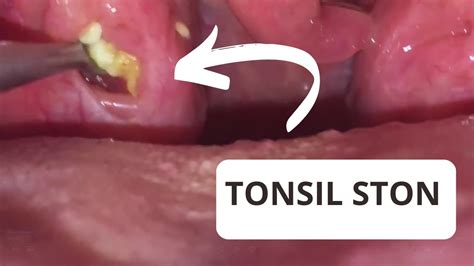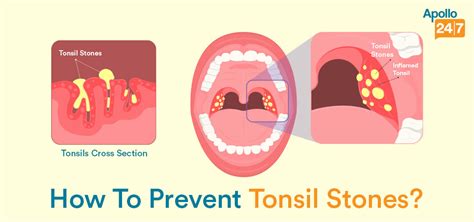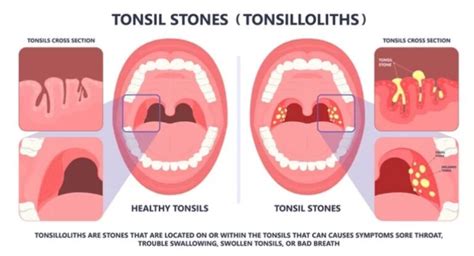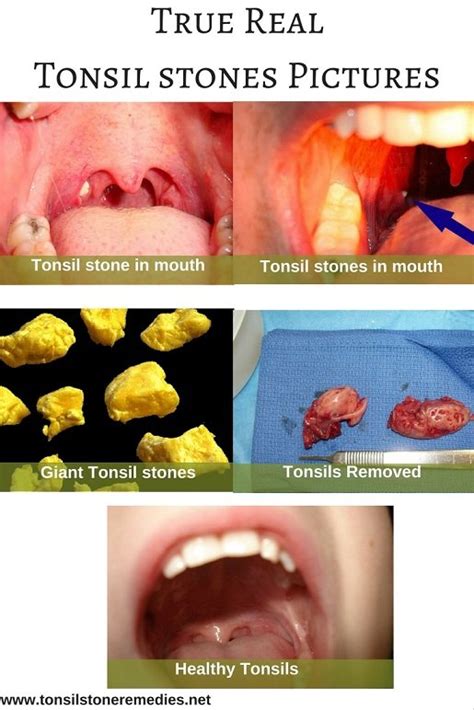Intro
Tonsil stone treatment options include removal, antibiotics, and home remedies, addressing symptoms and causes of tonsilloliths, bad breath, and sore throats.
Tonsil stones, also known as tonsilloliths, are small, hard deposits that form on the surface of the tonsils. They are typically white or yellowish in color and can be painful, causing bad breath, sore throats, and difficulty swallowing. Tonsil stones are relatively common, affecting up to 10% of the population, and can be a recurring problem for some individuals. Understanding the causes and symptoms of tonsil stones is essential in determining the best course of treatment.
The formation of tonsil stones is often linked to poor oral hygiene, allergies, and large tonsils. When food particles, mucus, and other debris accumulate on the surface of the tonsils, they can become trapped in the small crevices and crypts, providing a fertile ground for bacteria to grow. As the bacteria feed on the trapped debris, they produce volatile sulfur compounds, which give off a strong, unpleasant odor. If left untreated, tonsil stones can lead to more severe problems, such as recurrent tonsillitis, abscesses, and even respiratory infections.
Tonsil stones can be diagnosed through a physical examination, where a healthcare professional will visually inspect the tonsils for any signs of stones or other abnormalities. In some cases, a CT scan or MRI may be ordered to rule out other conditions, such as tonsillar cancer. Once diagnosed, there are several tonsil stone treatment options available, ranging from home remedies to surgical procedures. The choice of treatment depends on the size and location of the stones, as well as the individual's overall health and medical history.
Tonsil Stone Removal Methods

Home Remedies for Tonsil Stones
Some home remedies can help alleviate the symptoms of tonsil stones and even help remove small stones. These include: * Gargling with salt water to reduce inflammation and kill bacteria * Using a neti pot to rinse the nasal passages and sinuses * Drinking plenty of water to stay hydrated and thin out mucus * Avoiding dairy products and other foods that can trigger allergies and increase mucus production * Practicing good oral hygiene, including brushing and flossing regularly, to reduce bacteria and debris accumulationTonsil Stone Prevention

Tonsillectomy: A Surgical Option
In severe cases, where tonsil stones are large, recurrent, or cause significant discomfort, a tonsillectomy may be necessary. This surgical procedure involves removing the tonsils entirely, which can provide permanent relief from tonsil stones. However, it is a major surgery that requires general anesthesia and can have significant recovery time and potential complications, such as bleeding, infection, and changes in speech and swallowing.Recovery and Aftercare

Lifestyle Changes for Tonsil Stone Prevention
Making lifestyle changes can help prevent tonsil stones from forming and reduce the risk of recurrence. These changes include: * Quitting smoking and avoiding secondhand smoke * Avoiding foods that can trigger allergies and increase mucus production * Staying hydrated to thin out mucus and prevent debris accumulation * Practicing good oral hygiene, including brushing and flossing regularly * Managing stress and anxiety, which can exacerbate tonsil stone symptomsComplications and Risks

Tonsil Stone Treatment Options for Children
Tonsil stones can affect children and adolescents, and treatment options may vary depending on the child's age, size, and overall health. In general, treatment for children is similar to that for adults, with a focus on removal and prevention. However, children may require more frequent follow-up appointments and monitoring to ensure that the stones do not recur.Conclusion and Next Steps

We invite you to share your thoughts and experiences with tonsil stones in the comments below. Have you or someone you know struggled with tonsil stones? What treatment options have you tried, and what were the results? Your input can help others who are seeking information and support.
What are tonsil stones, and how are they formed?
+Tonsil stones, also known as tonsilloliths, are small, hard deposits that form on the surface of the tonsils. They are typically white or yellowish in color and can be painful, causing bad breath, sore throats, and difficulty swallowing. Tonsil stones are formed when food particles, mucus, and other debris accumulate on the surface of the tonsils and become trapped in the small crevices and crypts, providing a fertile ground for bacteria to grow.
What are the symptoms of tonsil stones, and how are they diagnosed?
+The symptoms of tonsil stones can include bad breath, sore throats, difficulty swallowing, and a sensation of something being stuck in the throat. Tonsil stones can be diagnosed through a physical examination, where a healthcare professional will visually inspect the tonsils for any signs of stones or other abnormalities. In some cases, a CT scan or MRI may be ordered to rule out other conditions, such as tonsillar cancer.
What are the treatment options for tonsil stones, and which one is best for me?
+The treatment options for tonsil stones include home remedies, such as gargling with salt water or using a waterpik, as well as professional removal by a healthcare professional or ENT specialist. In severe cases, a tonsillectomy may be necessary. The best treatment option for you will depend on the size and location of the stones, as well as your overall health and medical history. It is essential to consult with a healthcare professional or ENT specialist to determine the best course of treatment.
Can tonsil stones be prevented, and what lifestyle changes can I make to reduce the risk of recurrence?
+Yes, tonsil stones can be prevented by practicing good oral hygiene, including brushing and flossing regularly, and rinsing the mouth with an antibacterial mouthwash. Additionally, avoiding foods that can trigger allergies and increase mucus production, staying hydrated, and managing stress and anxiety can help reduce the risk of recurrence. Making lifestyle changes, such as quitting smoking and avoiding secondhand smoke, can also help prevent tonsil stones.
What are the complications and risks associated with tonsil stones, and how can they be managed?
+The complications and risks associated with tonsil stones can include recurrent tonsillitis, abscesses, respiratory infections, and bad breath. These complications can be managed by seeking medical attention if symptoms persist or worsen, practicing good oral hygiene, and following a proper treatment and aftercare plan. It is essential to consult with a healthcare professional or ENT specialist to determine the best course of treatment and management.
